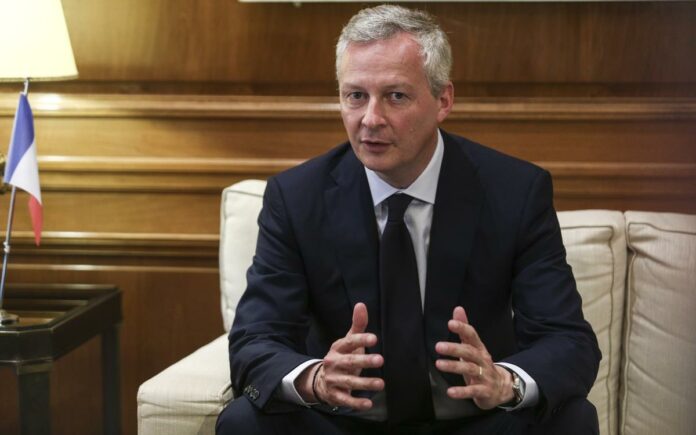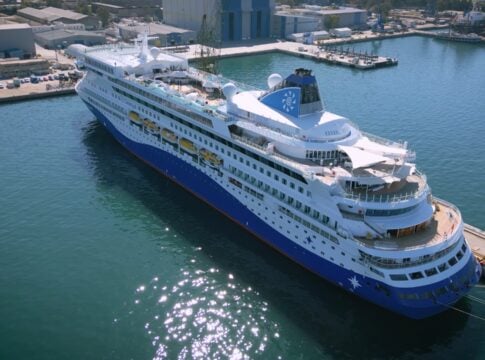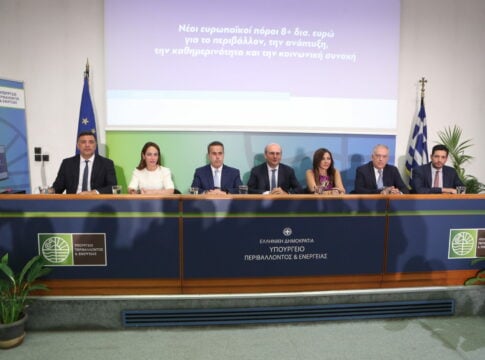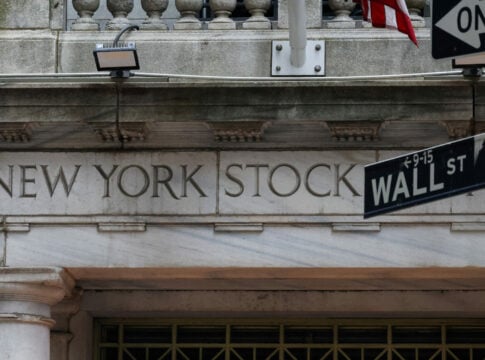By Vassilis Kostoulas
[email protected]
Paris will continue pushing for an ambitious implementation of last year’s Eurogroup decision regarding debt relief, as long as Athens continues to meet its commitments regarding reforms, French Economy and Finance Minister Bruno Le Maire told “N” only hours after the conclusion of a high-profile visit by French President Emmanuel Macron to the Greek capital.
Le Maire, 48, who has been active in the top echelons of French government since 1998, when he joined ministry of foreign affairs and international development and serving as farm and food minister between 2009 to 2012, detailed the Macron administration’s agenda for France, Greece and its Euro zone priorities.
In accentuating the positive, he referred to major progress by Greece over recent months on the reforms front, and said late July’s return by the country – after three years – to capital markets was a positive first step on the final stretch before the current bailout ends in August 2018.
Nevertheless, in repeating the leitmotif of caution expressed by most creditors’ representatives, Le Maire said much remains to be done, particularly with the specter of high unemployment still hanging over the country with a fragile economic recovery apparently underway.
Moreover, asked about the IMF’s role in Euro zone bailouts, such as the third consecutive program that Greece is still implementing, he offered a more diplomatic and finessed position than his boss, French President Macron, who repeated in Athens this past week that the Fund is more-or-less redundant in the Euro zone.
“… it will be useful to think again about the specific role of various institutional partners for the future,” Le Maire said, nevertheless implying that Paris is not considering a “change of gears” in the period remaining in the current Greek bailout program.
At the same time, he echoed Macron’s view that the European Stability Mechanism (ESM) has evolved into an institution that can assume the IMF’s role in the Euro zone.
In terms of bilateral relations, the French minister said he discerns investment interest by French companies in Greece’s infrastructure projects, particularly ones involving transports, while pointing to a large entourage – roughly 40 – of business and corporate leaders that accompanied Macron on his two-day visit to Athens.
Before touching on Greek issue, Le Maire also didn’t mince his words about France’s economic situation, noting that “for too long, France has lived above its means. Our level of public spending is not sustainable in the long run. We’ve known it for a long time, but successive governments have not had the courage to carry out the necessary cuts.”
As the Minister of Economy and Finance, you are promoting in France an agenda of expenditure cuts and tax reductions. Why do you choose this path to boost growth? Is this a recipe that you would recommend for the Greek case as well?
For too long, France has lived above its means. Our level of public spending is not sustainable in the long run. We’ve known it for a long time, but successive governments have not had the courage to carry out the necessary cuts. This time we have a real mandate from the French people to go ahead and make the necessary transformations to our economy – including the spending cuts. We know some may be painful, but they will be accompanied by many others reforms boosting training and investment for example. Taken together, they will be the foundation for a much stronger France – a France that is capable of growing over the long run. That’s why we’re committed to these changes.
France and Greece are not in the same position so it’s not possible to make a direct comparison. As a result of the crisis, Greece has already undergone deep reforms. It’s been extraordinarily tough. No one should belittle how difficult it has been for the Greek people and still is for many. But we’re now starting to see the fruit of these reforms: growth is expected to return this year. I encourage Greece to pursue its efforts to consolidate the recovery.
France is providing know-how to the Greek public administration, which is considered to be the “grave patient” of the Greek economy and is known for its resistance in face of the need for reform. I wonder, what is the picture that the French technocrats are conveying to you?
I am delighted that senior French civil servants are based in Athens to help the Greek public administration. It’s a symbol of the close friendship our two countries have always had. And I strongly believe that no system is perfect and that we all benefit from sharing information and experiences: it’s not a one way street. Modernization of the public administration could entail big benefits for the Greek economy and the Greek people.
My officials in Athens tell me that they’ve seen real changes, changes which are going in the right direction and that’s good news. They will continue to help and assist the Greek Public administration for as long as that can be helpful.
One of the first reforms that the new French government is putting on the table is that of the labor market to move towards a direction of greater flexibility. The Greek government is going to face similar issues in view of the third review of the program. In this context, what would you recommend to the Greek side? Are you convinced that flexible labor law increases employment?
Indeed, we have started the process of overhauling our labour market. We arestrengthening social dialogue, we are clarifying and making the redundancy framework more predictable and we are making recruitment simpler, in particular for SMEs. These changes will be supported by a massive effort on training. We are doing this because our labour market has become too rigid and it is having a negative effect on employment. The changes we are going to make are adapted to our labour market and its specificities. I don’t believe one can copy and paste a national labour model into a different country. It’s important each country looks hard at its own systems and tackles its own weaknesses with an approach adapted to its specificities.
The outgoing German government believes that a further debt relief, before the completion of the Greek program, would be a disincentive as far as the implementation of reforms is concerned. What is your opinion?
Enormous progress has been made in recent months. For the first time since 2014, Greece successfully issued government bonds on the markets in July: This is a positive first step towards a permanent return on the financial markets at the end of the programme. The Greek economy is expected to grow again this year. And Greece can finally see the end of the tunnel when it comes to the various support programmes.
So let’s first look at the big picture and take a moment to realise just how much has been achieved. We have set ourselves collectively a calendar and a process. Greece is due to exit its programme next summer. Clearly there will need to be a discussion at the right point in time about what comes next, and how can we further support Greece on its road to recovery.
What I can say is that Greece can continue to count on the active support of France – both in times of acute crises and in quieter more optimistic times as today. We don’t forget though that there is a long way to go – too many unemployed and a fragile recovery – so efforts must be sustained.
With respect to the Greek public debt , President Macron has been clear that he is in favour of debt relief measures which will contribute to restore long-term sustainability. Therefore; I will keep pushing for an ambitious implementation of the agreement reached by the Eurogroup last June, as long as Greece sticks to its commitments in terms of reforms.
Is France continuing to regard the IMF’s involvement in the European rescue programs necessary by definition? Why and for how long?
The Greek crisis was the worst crisis faced by a Eurozone country since the creation of the euro and everyone did the best they could in extraordinarily difficult circumstances, at a time when there was no financial assistance facility in the Eurozone. In this context, the financial involvement of the IMF but also its extensive experience in terms of economic reforms, was seen by many stakeholders as a reassuring factor, especially for the financial markets.
The situation has now evolved. We should also draw the lessons from this experience. We now have the European Stability Mechanism and we hope to quickly move forward with deeper integration of the eurozone. As part of that reflection, it will be useful to think again about the specific role of various institutional partners for the future.
Where do you detect Greece’s inability to attract a critical mass of investment that would be able to change the image of the Greek economy? In passing, how would you describe the French interest in the Greek privatization program?
Greece is attracting investment again and France is the 4th country which invests in Greece. There have been lots of great examples – Alstom and Vinci are two French firms particularly active in Greece, and they have signed important contracts in infrastructure projects. For example, Vinci Concessions has already invested more than € 3 bn in motorway works and Alstom Transport has signed contracts for the extension of Athens underground line 3 and for the construction of railways. The reason that President Macron and myself came over accompanied by 40 business leaders from all sectors, including SMEs, was to demonstrate that there is real appetite to invest in Greece – both by big business and start-ups.
French companies are involved in many sectors such as water management, electricity and airports. They have well-known and respected experience in terms of public service management with Suez and in motorways and airport management with Vinci.
The interest of French companies for privatization is growing and we will closely follow the decisions taken by TAIPED [Fonds de valorisation du patrimoine de l’Etat grec] on the ongoing projects, in the transport sector notably. My hope is that France and Greece will do more business together in the coming years as a results of the privatization programme but also beyond this.
France strongly supports the deeper political and economic integration of the Eurozone. The German side, however, seems to be cautious. How do you interpret this confidence crisis within the single currency? Is perhaps France responsible as well?
I believe the debate has evolved. There is greater recognition across Europe that we need to integrate further within the eurozone if we want the eurozone to not just survive but thrive over the long run. I also believe that thinking in many capitals, including in Berlin has evolved. The German Chancellor has recently said that she was ready to discuss these points. The European Commission has published a good reflection paper on the future integration of the eurozone – with some useful and innovative ideas. We will face a unique window of opportunity after the German elections to make progress. We must seize it. That’s why President Macron will put forward ideas on the table in coming weeks on how best to strengthen the eurozone – to ensure there is both more solidarity, more responsibility, and more democracy.
The endeavor of globalization is facing hurdles, but is also showing resilience. How do you think the EU should react within this complicated economic and social environment?
Globalization has many benefits but those benefits need to be shared by all. And that’s not always the case today. Europe needs to protect its citizens further: we don’t want to be protectionist as that won’t benefit any of us in the long run, but we do need to protect our citizens and defend our interests much more actively – in the same way other great economic powers do. That means ensuring trade rules at a global level are fair. It means ensuring reciprocity in public procurement, improving our trade defense instruments and it means a better control of third country investments in key sectors. Again, this is not protectionism – it’s about ensuring a global level playing field, defending our strategic interests and making of Europe a real economic power.
What is the most valuable conclusion you have possibly drawn from the prevalence of Emmanuel Macron in the latest French elections and you would like to share with the Greek citizens?
I would argue the pessimism has been defeated ! The French people have made the choice of openness – not nationalism or protectionism. They have also sent a clear signal in favour of Europe. I know how important the European project is for the Greek people in spite of the recent crisis. And I do hope that we can contribute together with the Greek authorities to giving the European project a new impetus.














